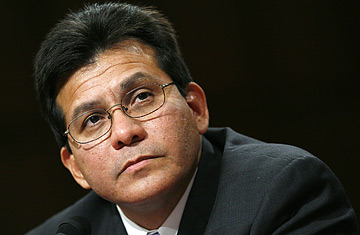
U.S. Attorney General Alberto Gonzales.
Committee chairman John Conyers, Jr., and Linda Sanchez, chairwoman of the Judiciary subcommittee on Commercial and Administrative Law, co-signed letters today to White House Counsel Fred Fielding and former White House Counsel Harriet Miers, requesting that both Miers and current deputy White House counsel William Kelly submit to interviews with the committee concerning the fired U.S. attorneys. The letters also ask that the White House supply comprehensive documentation of all discussions and communications dealing with the matter.
The letters specifically ask for communications on the firings between the White House and the Department of Justice as well as with members of Congress, in addition to materials dealing with internal White House deliberations.
"Until we get a clear and credible answer from the Bush Administration on who made the decision to fire these U.S. attorneys, and why they did it, we will continue our investigation," said Conyers, the Democratic committee chairman.
Sanchez, a California Democrat, added that she is "hopeful that the Bush Administration will work with us to get to the truth of this issue, especially after reading the Attorney General's stated support for legislation that would take politics out of the U.S. attorney selection process." Following this week's hearings, Attorney General Alberto Gonzales indicated publicly that the Administration would not oppose legislation reinstating safeguards on the appointment of U.S. attorneys that were scuttled last year by a last-minute alteration to the Patriot Act.
Gonzales had tried to dismiss the controversy as an "overblown personnel matter," but his attitude appeared to irritate the Judiciary Committee's leading Republican, Sen. Arlen Specter. "One day there will be a new attorney general," Specter said at this week's public hearing in the Senate, "maybe sooner rather than later."
Not long after that, Gonzales met with senators to make clear that Bush would not oppose a Democratic measure intended to eliminate the attorney general's current prerogative to appoint federal prosecutors without Senate confirmation. Previously, the Justice Department had spoken out against such legislation.
Gonzales also made clear that subpoenas would not be necessary to obtain testimony from five of Gonzales's aides involved in the firings. The attorney general's abrupt retreat was also reflected in a statement from a Justice Department spokesman: "In hindsight, we should have provided the U.S. attorneys with specific reasons that led to their dismissal that would have helped to avoid the rampant misinformation and wild speculation that currently exists." He added that "we will continue to work with Congress to reach an accommodation on providing additional information."
But working with Congress could prove increasingly difficult, as the controversy escalates in an environment of mistrust. Sanchez asserted Friday: "The threshold for cooperation in Washington used to be 'Trust, but verify.' We are sending these letters today because, at this point, we'd be happy just to verify."
The Committee's demand for additional materials is not likely to be well-received at the White House, which has balked in the past at turning over documents describing its internal deliberations. But following this week's hearings in both the House and Senate, which raised questions about the propriety and even the legality of some actions leading to the firings of the U.S. attorneys, any refusal to cooperate with Congressional probes would likely carry a political cost.
The letter to Fielding noted that questions at the hearings have been raised "concerning the involvement of the White House, which of course made the final decision to fire these U.S. attorneys." The letter requesting an interview with Miers said: "We would appreciate the opportunity to interview you, hopefully on a voluntary basis, about your knowledge and activities concerning the termination of these U.S. attorneys." The clear implication is that if Miers or the White House should resist making her available to the Committee, a subpoena could be issued to compel her testimony.
The White House told TIME it was studying the letters, and would have no further comment at this time.
